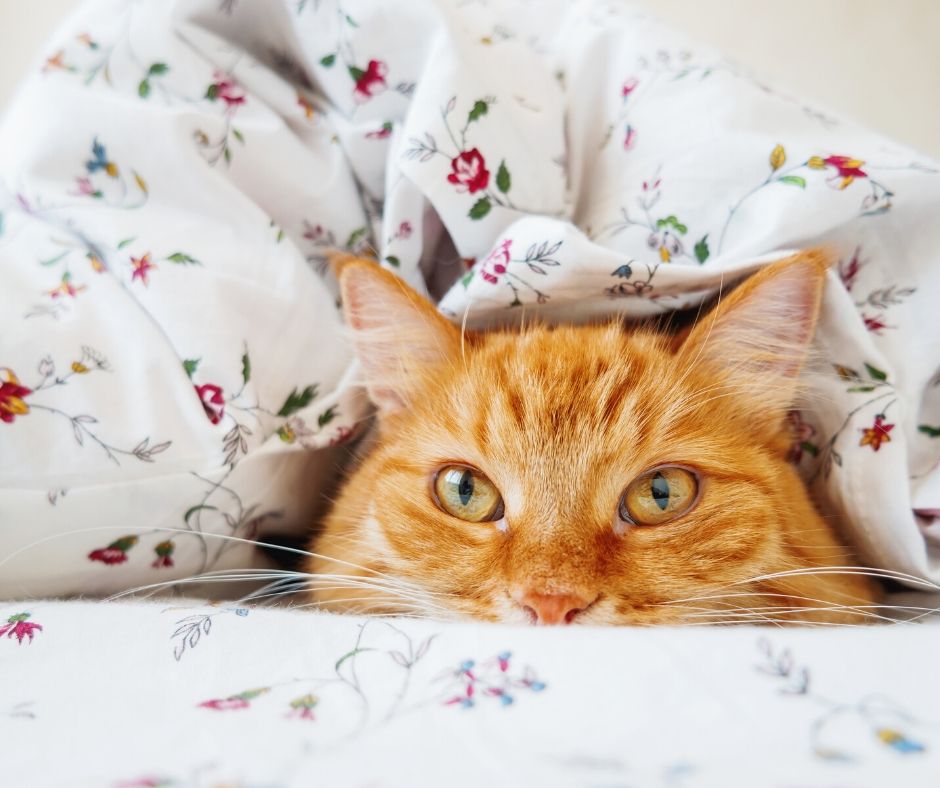Have you ever seen a dancing cat, making faces and weird sounds? Well, although the symptoms described may resemble catnip’s effects, not everything that looks funny can be harmless to the cat. Some behavior should alert us, because they may indicate the early stages of illness or other cat-related ailments.
Unusual behavior can take many shapes, from stunning meowing, breaking a speed record in the apartment, and even … sucking on a woolen blanket! We decided to make for you a review of those that can potentially indicate disease and those that are only … a state of cat’s mind! 🙂 See what we’ve collected.
Loud meowing
If a cat meows louder than usual, it certainly has its reason. One of it may be entering the mating season – if the animal has not been sterilized, be ready for night concerts (and your neighbours too!). In this case, loud mewing is an attempt to lure a potential partner. However, if the time of cat’s courtship has passed, and the furry meows louder and more intensely than usual, this may indicate behavioral problems, what is probably caused by illness or stress. The cat can show nervousness, signal suffering related to physical pain (especially if it’s loud and prolonged mewing in isolation), and even mourn a lost friend in this way.
P.S. Do you remember Merlin – the loudest cat in the world? 🙂
Sucking wool
We would like to ask a cat’s behaviorist what’s going on with this sucking, because it sounds crazy!). Apparently, this addiction is quite popular with some cats, and Siamese have found a predilection in this activity. Sucking on woolen products doesn’t indicate disease symptoms and we have not really found a good diagnosis describing the reasons for this peculiar behavior of cats. Maybe some of you know more about this?
Leaning up the head against the wall
Cat leaning its head against the wall? The internet is full of funny videos with cats doing this. Although this phenomenon looks innocent, it can have serious consequences for the cat in the form of neurological disorders. If you observe this kind of behavior with your pet, better make an appointment with vet immediately.
Balance disorder
Cats on shaky legs are definitely a rarer phenomenon than the same ailment in humans. 🙂 However, it could also happen to them. A cat’s balance disorder can manifest itself differently – from a strange, unnatural gait or run, falling from the edge of the furniture, or missing a place that the cat has targeted (e.g. while playing). This behavior may indicate a neurological disease, inner ear disorders, but it’s also the effect of shortened or thinned mustaches (the whiskers serve the cat as a natural scoop and ensure proper body balance).
Walking on walls
Of course, this is kind of metaphor, but how vivid! Cat’s Usain Bolt has certainly demolished more than one apartment, and a volcano of cat’s energy can erupt in the least expected moment (although we can expect increased activity at night or shortly after eating). Cat’s sprint is an attempt to discharge furry’s surplus energy, although sometimes it can be a cat’s way to fight fleas or other parasites.
Lifestyle change
Energetic cat suddenly became lethargic, and it’s definitely not an overeating effect? Or maybe the other way round, the peaceful sleepyhead turned into Mr. Hyde? Each of these situations should alarm every cat caretaker. Reducing or increasing animal’s daily sleep time may be a symptom of illness, so it’s better not to delay your visit to your cat’s doctor and quickly do all the necessary tests.
Hiding from the cat caretaker
If your cat suddenly runs away, and yesterday he spent a few hours on your lap – that’s a sign, that something is happening. If this is not the result of being crushed by your knee while taking a nap together, or being late with dinner, then you need to look elsewhere. We had a similar case with our Figo, what became the inspiration to design the MIA cardboard cat house. The advice of a cat behaviorist came to our aid, but in such a situation it’s worth to go with the animal to the vet, because this type of behavior may indicate symptoms, for example, a serious brain tumor.
Check out:
Obsessive hair care
Cats are pretties and spend long hours caring for fur. Combing the hair and cleansing it from dirt are among our pets’ everyday rituals, but too much licking the fur, combing teeth and scratching may indicate some health problems that can easily lead to skin diseases. Behaviors of this type are described as obsessive-compulsive, and excessive care of fur may result from boredom and too few stimuli (especially in non-outgoing cats) or occur as a result of stress.
On our own example, we can say that trivializing too frequent washing of a cat can lead to problems. Kici (Justyna’s from myKotty’s team cat), from an early age tends to care about fur too much often. Initially, her behavior didn’t arouse suspicion, but when she turned one, inflammatory foci appeared on the skin. It was the moment when the fight for the cat’s health had to be started. After consulting a specialist, choosing the right diet and application of dedicated medicines, we managed to win it, but, as you can see, you have to keep your eyes open! Each allergen causes obsessive licking and subsequent wounds. The example of Kici shows, that the problem can be really serious and lead to complications, so keep an eye on your furries and react before it’s too late.
Urination outside the litter box
If the cat is choosing every other place, except for the litter box (although he used it regularly before), we should carefully look at the pet. Probably our house has just turned into a battlefield, and the cat decided to mark its territory (especially when another animal appears under the roof). A similar situation can happen to cats in the mating season – it could be the way of lure partners. Sometimes cat in this way also signals to human, that change in its surroundings (rearranging, changing the current place of the litter box, or changing the lifestyle of cat’s caretaker) simply bothers him, so we better try to do such revolutions in the life of our cat gently!
Another cause could be a medical issues. An obese cat that doesn’t fit into the litter box (especially the indoor one) is more likely to fulfill physiological needs outside the toilet area. In this case, we should also be disturbed by other strange behavior of the cat, e.g. constant drinking of water, which may even indicate diabetes. On the other hand, if cat bends its back unnaturally during urinating and it appears that the activity itself causes him effort or pain – these are probably signs of a genitourinary disease (e.g. urological syndrome). In this case you will need a visit to the vet.
Eating and drinking disorders
Furries usually don’t hurry while eating, and the gluttony isn’t fitting the cat (our Teddy will gladly refute this thesis!). Greedy eating – except in cases of starving the cat, competing for food with another individual, or period of intensive growth – may indicate health problems. It will be similar with appetite disorders – lack of cat’s appetite should also be alarming. It is good to pay attention to the amount of water your pet consumes – if, for example, he drinks more and more often than usual, these may be symptoms of diabetes or other diseases that are dangerous to the cat.
Scratching furniture
The review of unusual cat’s behavior couldn’t miss the section about scratching furniture! Many of you probably snort like a cat now thinking, “Are you joking?! My furry is scratching since first day of its life and it will be unusual if he stops!” It’s hard to disagree with this! Believe it or not, there are cats in the world not interested in destroying home furnishings. However, we know mainly those that scratch (actually we founded the company 8 years ago for them and today we are a top producer of cat’s furniture). Scratching cats, in addition to sharpening claws, also mark the area (in the paws there are scent glands). If a cat, usually calm, begins to destroy our goods, he probably relieves stress, fights boredom or shows pain. In such cases, it’s worth to visit a cat behaviorist, and if the devastation persists, consult a veterinarian. Of course, don’t forget about a good cat scratcher!
What does the cat behaviorist do? Check out our blog – we’re going to publish a new article about that in a few next weeks.
As you can see, there may be many unusual cat’s behaviors, we have described only a few those that we know and those that we heard from the stories of our clients and friends. We will be happy if you add to our collection behaviour anomalies of your furries, helping all fabCats to identify potential threats for their pets.
All comments are welcomed!





I have two females that have been together since birth, they are indoors and they are not fixed. They just turned 3 years old and one of them have gotten mean. She will hiss and swat at the other one for no reason. She has also started hissing and swatting at my boyfriend. Is this a territorial thing or something else possibly? Thank you